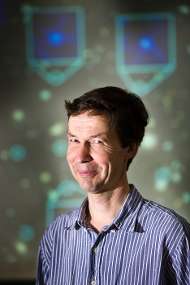Marijn Franx
Marijn Franx (born 20 July 1960) is a Dutch professor of Astronomy at Leiden University. He was a winner of the 2010 Spinoza Prize.[1] His research focuses on the formation and evolution of galaxies. He is involved with both the Hubble and James Webb Space Telescopes.

Career
Franx was born on 20 July 1960 in Eindhoven.[2] He studied astronomy at Leiden University and graduated cum laude in 1984. Four years later he obtained his doctorate from the same university.[1] From 1988 to 1991 Franx was a Junior Fellow of Harvard University.[3] In 1991 he became a Hubble Fellow.[4] Between 1993 and 1998 he was professor of astronomy at the University of Groningen, he then moved to Leiden University where he has held the same position since.[1]
In 2008 Franx received a European Research Council Advanced grant of 1.5 million euro.[5] He is member of the Royal Netherlands Academy of Arts and Sciences since 2009.[6]
In 2010 he was one of four winners of the Dutch Spinoza Prize and received a 2.5 million euro grant.[7] The awarding organisation, the Netherlands Organisation for Scientific Research, praised Franx for being the lead Dutch scientist to use the Hubble Space Telescope and his research on the formation and evolution of galaxies.[1] Franx is the only Dutch scientist to work on the successor to the Hubble Space Telescope, the James Webb Space Telescope.[8]
In March 2016 it was announced that a team of researchers, including Franx, had discovered the farthest galaxy thus far, located at 13.4 billion lightyears.[9]
References
- "Prof. M. (Marijn) Franx". Netherlands Organisation for Scientific Research. 27 August 2014. Retrieved 1 August 2015.
- "Astronomer Marijn Franx wins Spinoza Prize" (in Dutch). SRON Netherlands Institute for Space Research. 10 July 2010. Retrieved 17 March 2016.
- "Current and Former Junior Fellows". Harvard University. Archived from the original on 16 January 2013. Retrieved 1 August 2015.
- "Hubble Fellowships: Listing of all Hubble Fellows 1990-2014". Space Telescope Science Institute. Retrieved 1 August 2015.
- "Marijn Franx to study earliest stellar galaxies". Leiden University. 29 August 2008. Retrieved 1 August 2015.
- "Marijn Franx". Royal Netherlands Academy of Arts and Sciences. Retrieved 1 August 2015.
- "NWO Spinoza Prize 2010". Netherlands Organisation for Scientific Research. 27 August 2014. Retrieved 1 August 2015.
- Harmen Simon Teunis (9 September 2013). "Nieuwe mijlpaal in ontwikkeling opvolger Hubble-telescoop" (in Dutch). BNR Newsradio. Retrieved 1 August 2015.
- "Astronomen zien uitzonderlijk helder sterrenstelsel op recordafstand" (in Dutch). Astronomie.nl. Retrieved 3 March 2016.